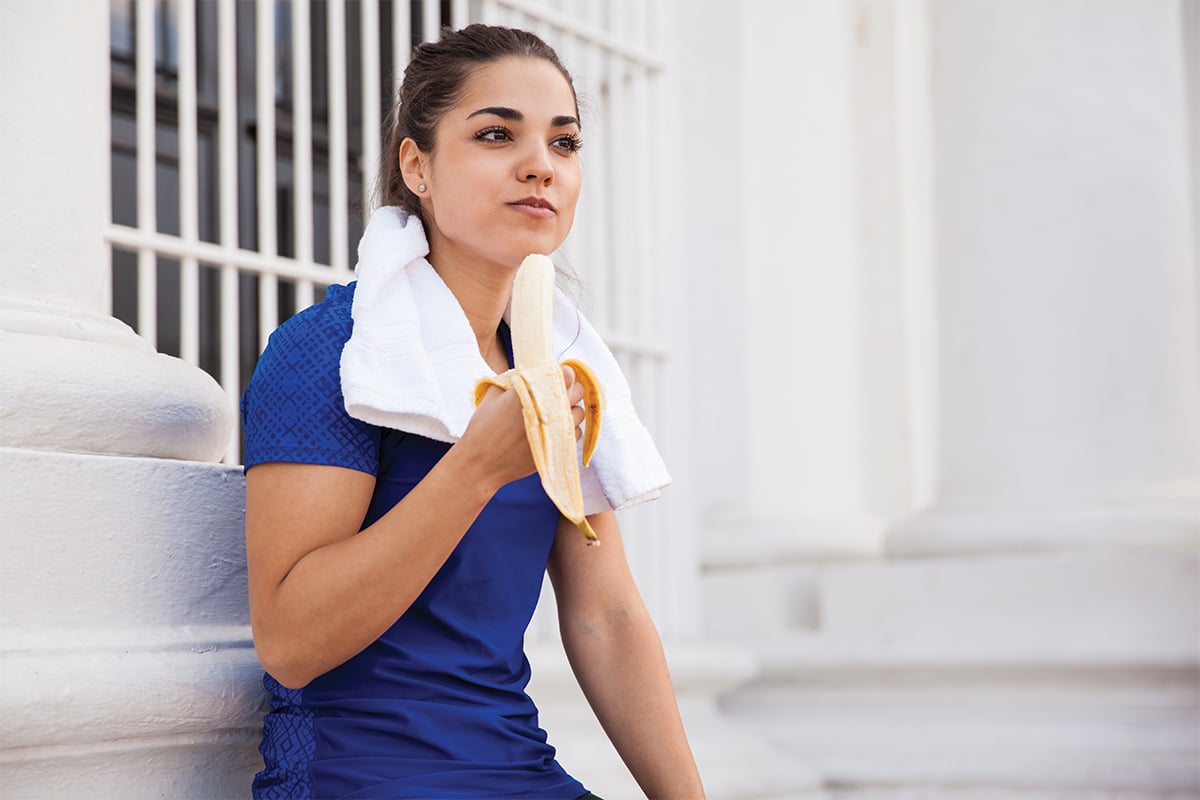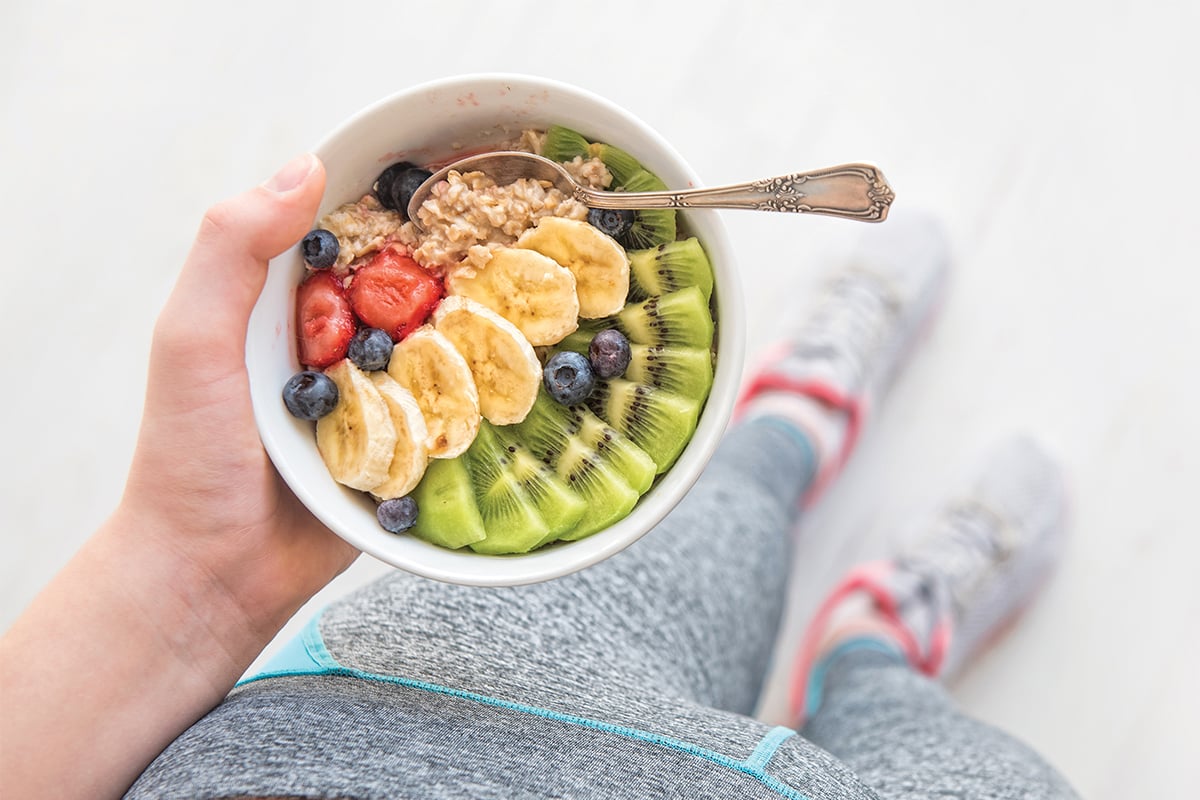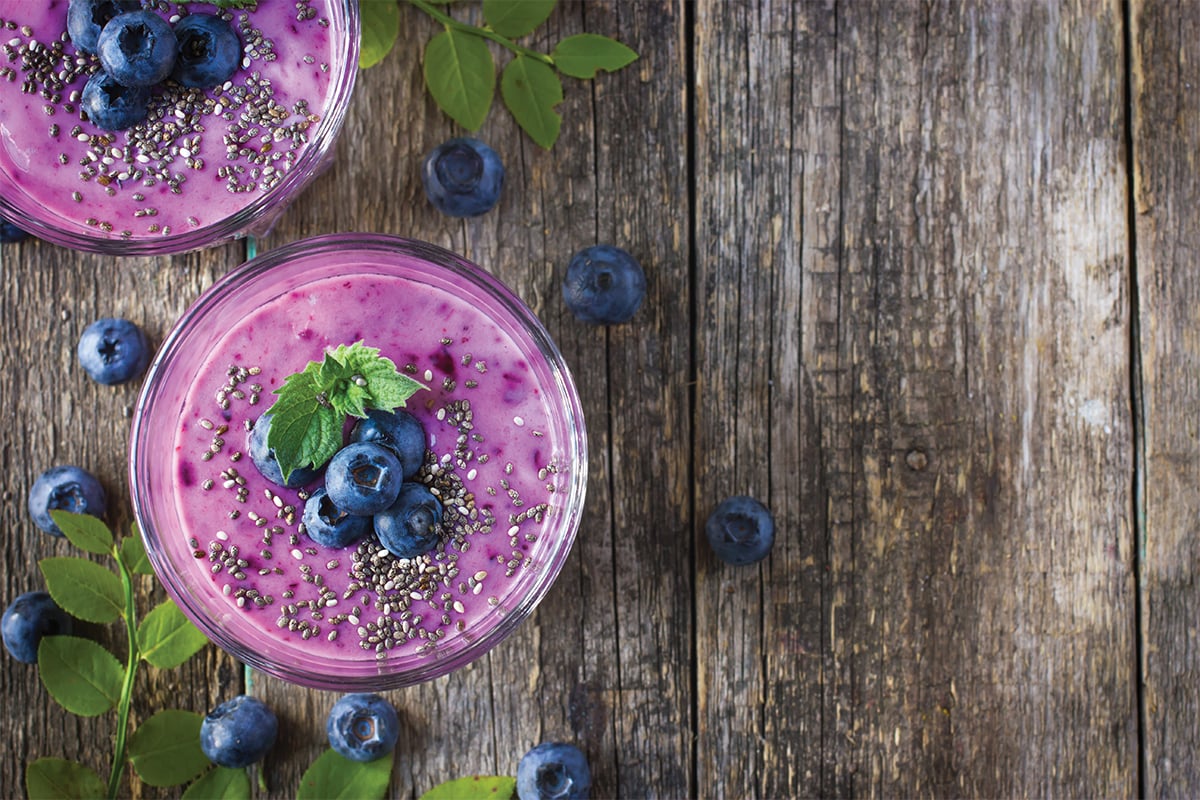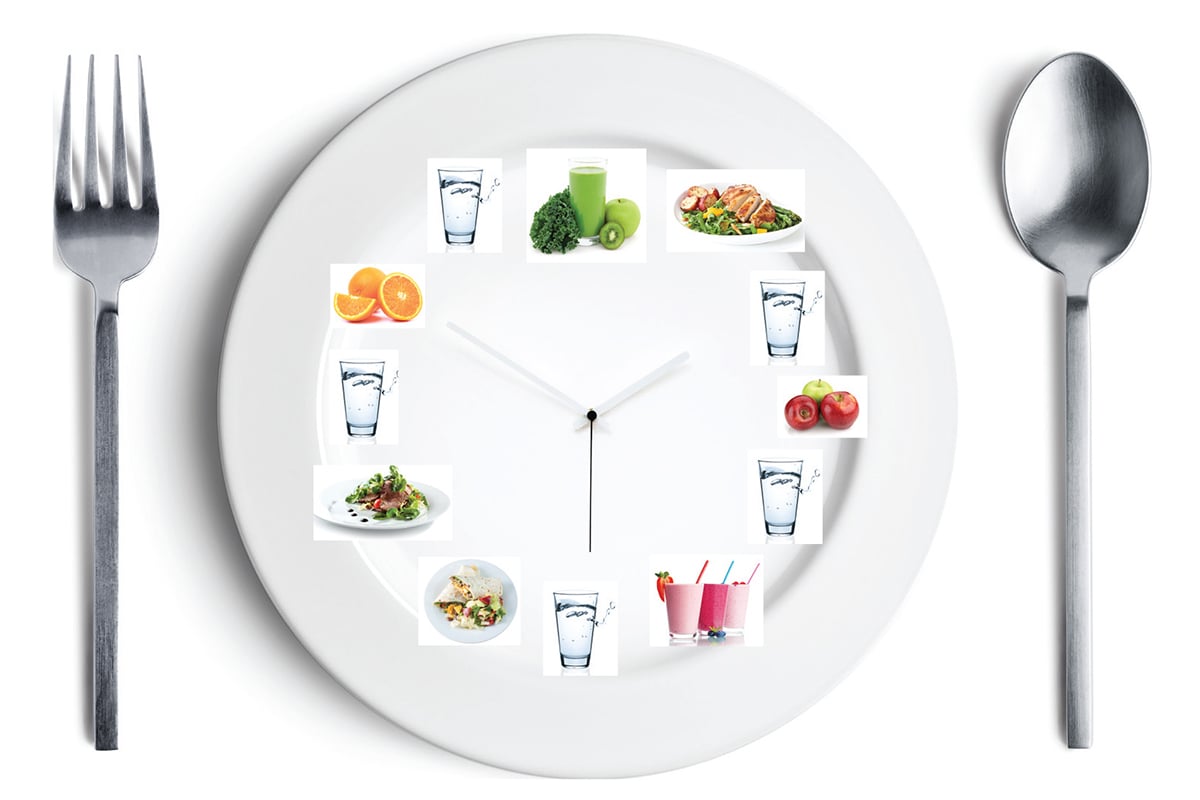Originally appeared in the 2017 spring issue of American Fitness Magazine.
Diet and exercise are the primary pillars of a healthy lifestyle plan. But can coordinating eating and workout schedules improve our fitness results? And if so, how should our eating patterns differ before, during, and after activities?
Melding a top-notch diet with stimulating exercise can be quite a challenge. Eating at different times, not targeting healthy weight loss foods, skipping meals, overeating, snacking in between, working out irregularly, suffering from injuries … life gets in the way of our "healthy lifestyle plans." While flexibility can be a necessity and a virtue, keeping to a diet-and-exercise schedule has remarkable advantages.
Eating regularly (5-7 times) throughout the day maintains proper blood sugar and energy levels, while regular exercise consistently burns consumed calories (Alencar et al. 2015). Indeed, proper timing of nutrition and activity helps lay the foundation for optimizing physical results.
**If you are a nutrition coach, it pays to supplement your expertise with these nutritional insights. Find more NASM nutrition courses here to futher your knowledge.
Does Fast-and-Burn Work for Weight Loss?
As we explore the benefits of coordinating workouts with food intake-both quality and quantity-your first question might focus on breakfast (as in, should you skip it) or some other fast-and-burn routine.
Some studies suggest intense physical activity such as running, swimming or bicycling on an empty stomach can increase fat burn and promote weight loss (Schisler & Ianuzzo 2007). However, many experts caution against pre-exercise fasting. Running on empty may help burn fat faster, but it won't leave enough energy for more rigorous training.
It also can increase the risk of strains, sprains, stress fractures and other injuries from exercise-related fatigue. Furthermore, letting the body get too depleted may cause people to overeat afterward, undoing the benefits of exercising in the first place.
Therefore, adequate fueling before exercise is the better route to improving performance (Rosenbloom & Coleman 2012). This keeps the body fueled, providing steady energy and a satisfied stomach. Knowing the why, what and when to eat beforehand can make a significant difference in your training.
As Jackie Kaminsky notes in her blog 10 Nutrition Myths, nutrient timing can be effective overall, but it's not for everyone.
Training and Nutrient Timing Before Events
A diet plan is crucial for maximizing daily workouts and recovery, especially in the lead-up to the big day. And no meal is more important than the one just before a race, big game or other athletic event.
Choosing the wrong foods-eating or drinking too much, consuming too little or not timing a meal efficiently-can dramatically affect outcomes. Eating the ideal pre-race/event meal can help ensure that all of the hard training and dedication pay off. Similarly, maintaining an appropriate daily sports-nutrition plan creates the perfect opportunity for better results.
WHY Eat Before a workout?
The main goal of a pre-event/workout meal is to replenish glycogen, the short-term storage form of carbohydrate. This supplies immediate energy needs and is crucial for morning workouts, as the liver is glycogen depleted from fueling the nervous system during sleep. The muscles, on the other hand, should be glycogen-loaded from proper recovery nutrition the previous day.
The body does not need a lot, but it needs something to prime the metabolism, provide a direct energy source, and allow for the planned intensity and duration of the given workout. But what is that something? That choice can make or break a workout. It is a good idea to experiment with several pre-exercise snacks/meals and stick with the few that work best under given circumstances.
WHAT to Eat Before a workout
The majority of nutrients in a pre workout meal should come from carbohydrates, as these macronutrients immediately fuel the body. Some protein should be consumed as well, but not a significant amount, as protein takes longer to digest and does not serve an immediate need for the beginning of an activity. Fat and dietary fiber also should be marginal to minimize the potential for gastrointestinal upset during the activity (Smith & Collene 2015).
Research has demonstrated that the type of carbohydrate consumed does not directly affect performance across the board (Campbell et al. 2008). Regular foods are ideal (e.g., a bagel with peanut butter), but convenience foods (energy bars or replacement shakes) may be helpful because you can determine the calories and the desired mix of carbohydrates, protein and fats.
Exercisers might also supplement with a piece of fruit, glass of low-fat chocolate milk or another preferred carbohydrate, depending on needs.
Pre-exercise fluids are critical to prevent dehydration. To allow time to excrete excess fluid, start at least 4 hours before an activity and aim for an intake of 5-7 milliliters of water per kilogram of body weight (Rosenbloom & Coleman 2012). Before that, the athlete should drink enough water and fluids so that urine color is pale yellow and dilute-indicators of adequate hydration.
Read more: What to Eat Before a Workout
WHEN to Eat Before a workout?
Timing is a huge consideration for preworkout nutrition. Too early and the meal is gone by the time the exercise begins; too late and the stomach is uncomfortably sloshing food around during the activity. Although body size, age, gender, metabolic rate, gastric motility and type of training are all meal-timing factors to consider, the ideal time for most people to eat is about 2-4 hours before activity.
This much lead time can allow people to safely eat up to about 1,000 nutritious calories that will be ready for fueling the activity (Smith & Collene 2015). If lead times are much shorter (a pre-7 a.m. workout, for example), eating a smaller meal of less than 300-400 calories about an hour before the workout can suffice.
It is customarily recommended that exercisers consume about 1 gram of carbohydrate per kilogram of body weight 1 hour before working out, and 2 g of carbohydrate per kg of body weight if 2 hours before exercise, and so on (Dunford & Doyle 2008).
For a 150-pound athlete, that would equate to about 68 g (or 4-5 servings) of carbohydrate, 1 hour before exercise. For reference, 1 serving of a carbohydrate food contains about 15 g of carbohydrate.
There are about 15 g of carbohydrate in each of the following: 1 slice of whole-grain bread, 1 orange, ½ cup cooked oatmeal, 1 small sweet potato or 1 cup low-fat milk. This 150-pound athlete could consider consuming: ½ cup oatmeal, 1 small apple, ½ cup low-fat yogurt and 4 ounces 100% fruit juice-all approximately 1 hour before working out.
It is generally best that anything consumed less than 1 hour before an event or workout be blended or liquid-such as a sports drink or smoothie-to promote rapid stomach emptying. Bear in mind that we are all individuals and our bodies will perform differently. It may take some study to understand what works best for you. Athletes should experiment with the size, timing and composition of pre-event/activity meals to determine what will be best tolerated.
effective Eating Before a workout
Preworkout foods should not only be easily digestible, but also easily (and conveniently) consumed. A comprehensive preworkout nutrition plan should be evaluated based on the duration and intensity of exertion, the ability to supplement during the activity, personal energy needs, environmental conditions and the start time.
For instance, a person who has a higher weight and is running in a longer-distance race likely needs a larger meal and supplemental nutrition during the event to maintain desired intensity.
Determining how much is too much or too little can be frustrating, but self-experimentation is crucial for success. The athlete ought to sample different prework-out meals during various training intensities as trials for what works. Those training for a specific event should simulate race day as closely as possible (time of day, conditions, etc.) when experimenting with several nutrition protocols to ensure optimal results.
See how to count macros to keep your nutrient timing as effective as possible.
should you eating During a workout?
Supplemental nutrition may not be necessary during shorter or less-intense activity bouts. Athletes may need to eat during the activity if exertion lasts more than roughly 1 hour and/or environmental conditions require glycogen to be restored to maintain intensity and/or duration. If so, carbohydrate consumption should begin shortly after the start of exercise.
The general recommendation is based on the maximum rate of glucose absorption, which is to consume about 30-60 g of carbohydrate per hour during prolonged exercise (Rosenbloom & Coleman 2012). One popular sports-nutrition trend is to use multiple carb sources with different routes and rates of absorption to maximize the supply of energy to cells and lessen the risk of GI distress (Burd et al. 2011).
Sports drinks with 6-8% carbohydrate are quick and convenient sources of fluid, carbohydrate and electrolytes during extended bouts of exercise. Consuming 6-12 ounces of such drinks every 15-30 minutes during exercise has been shown to extend the exercise capacity of some athletes (ACSM 2007). However, athletes should refine these approaches according to their individual sweat rates, tolerances and exertion levels.
Some athletes prefer gels or chews to replace carbohydrates during extended activities. These sports supplements are formulated with a specific composition of nutrients to rapidly supply carbohydrates and electrolytes. Most provide about 25 g of carbohydrate per serving and should be consumed with water to speed digestion and prevent cramping.
workout recovery basics and nutrition
To improve fitness and endurance, we must anticipate the next episode of activity as soon as one exercise session ends. That means focusing on recovery, one of the most important-and often overlooked-aspects of proper sports nutrition.
An effective nutrition recovery plan supplies the right nutrients at the right time. Recovery is the body's process of adapting to the previous workload and strengthening itself for the next physical challenge. Nutritional components of recovery include carbohydrates to replenish depleted fuel stores, protein to help repair damaged muscle and develop new muscle tissue, and fluids and electrolytes to rehydrate.
A full, rapid recovery supplies more energy and hydration for the next workout or event, which improves performance and reduces the chance of injury. Rapid recovery is especially crucial during periods of heavy training and anytime two or more training sessions happen within 12 hours (Smith & Collene 2015).
When to Start Replenishing Carbs AFTER exercise
Training generally depletes muscle glycogen. The first 30 minutes or so after exercise provide an important opportunity for nutritional recovery due to factors like increased blood flow and insulin sensitivity, which boosts cellular glucose uptake and glycogen restoration (Rosenbloom & Coleman 2012).
To maximize muscle glycogen replacement, athletes should consume a carbohydrate-rich snack within this 30-minute window. The recommendation for rapidly replenishing glycogen stores is to take in foods providing 1.0-1.5 g of carbohydrate per kg of body weight within 30 minutes of extended exercise (Smith & Collene 2015).
For a 150-pound athlete, that equates to between 68 and 102 g of carbs (or ~ 4.5-6.5 servings of carbs) immediately after exercise. Since this can be difficult to consume in whole foods shortly after activity, liquid and bar supplements may be useful and convenient after exercise.
Ideally, athletes should repeat this carbohydrate load for 2-hour intervals for up to 6 hours, or transition to carbohydrate snacks and meals if another intense training session will occur within 24 hours (Smith & Collene 2015). Consuming smaller amounts of carbohydrates more frequently may be prudent if the previous recommendation leaves the athlete feeling too full.
Bananas are a great source of healthy carbs, if you didn't know!

What About PROTEIN?
Muscle tissue repair and muscle building are important for recovery. Whether you're focusing on endurance or strength training, taking in protein after a workout provides the amino acid building blocks needed to repair muscle fibers that get damaged and catabolized during exercise, and to promote the development of new muscle tissue.
Although daily protein requirements vary among individuals, consuming 15-25 g of protein within 1 hour after exercise can maximize the muscle rebuilding and repair process (Rosenbloom & Coleman 2012).
Recent research has further demonstrated that a similar amount of protein (approximately 15-30 g) after resistance exercise may even benefit athletes on calorie-restricted diets who also want to maintain lean body mass (Areta et al. 2014).
It is important to note that some literature emphasizing extremely high levels of protein intake-well beyond these recommendations-for strength training may be dated and lack quality research (Spendlove et al. 2015).
REHYDRATE Effectively With Fluids and Sodium
Virtually all weight lost during exercise is fluid, so weighing yourself (without clothes) before and after exercise can help gauge net fluid losses. Replace fluids by gradually (within 4-6 hours) drinking 16-24 fluid ounces of a recovery beverage, sports drink or water for every pound of weight lost (Smith & Collene 2015).
It is important to restore hydration status before the next exercise period. Rehydration will be more effective when sodium is included with the fluid and food consumed during recovery-especially in hot/humid conditions. However, water may be all you need if exercising for less than 1 hour at a low intensity.
Listen to Your Body's Timing Signals
While these recommendations are a good starting point, there are no absolute sports nutrition rules that satisfy everyone's needs…so paying attention to how you feel during exercise and how diet affects performance is of utmost importance.
You may have to use different timing and alternate routines to create a nutrition and exercise combo that works best. Timing certainly is critical in sports nutrition, and optimizing that can make all the difference!
Read also: Muscle Clocks - The Value of Synchronized Training
Quick Tips for Eating and Drinking Before a Race/Event
- Nutrients: Most should come from carbohydrates. Consume only small amounts of protein; limit fats and fiber (see these foods that are high in fiber that you should avoid!)
- Hydration: At least 4 hours before an activity, aim for 5-7 milliliters of water per kilogram of body weight.
- Timing: Ideal for most people is to eat 2-4 hours before an activity, up to about 1,000 nutritious calories. Consume 300-400 calories if lead time is much shorter (e.g., early morning workouts). Drinks or smoothies are preferred if you're starting in less than 60 minutes.

Fast fix: You can positively affect event outcomes by eating the right foods in the right amounts at the right times.

Best Post-Workout MEals
- Fruit smoothie made with a variety of frozen/fresh fruit and low-fat milk/yogurt, and possibly protein powder (depending on needs)
- Energy bar containing 15-20 grams of protein, with 100% fruit or vegetable juice
- Whole-grain bagel or English muffin topped with peanut butter and banana, with 100% fruit or vegetable juice
- Whole-grain pasta or cheese ravioli and tomato-based sauce, with whole-grain bread, steamed vegetables, low-fat/nonfat milk, and fruit
- Grilled chicken sandwich on whole-grain bread, with cottage cheese and a baked sweet potato
- Baked or grilled lean beef, chicken, turkey or fish, with steamed brown rice, a whole-grain dinner roll, cooked greens, low-fat yogurt and fruit
A good way to start recovery is to consume a snack with carbohydrates and a moderate amount of protein, plus fluids and sodium, within 30 minutes after exercise. If you have no appetite post-exercise, a recovery beverage may be a good option.
Cool down, chow down: Don't skimp on food and fluids after a workout.
To recover quickly and completely, your body needs healthy fuel like the choices shown here-beginning within 30 minutes of your session's end.
REFERENCES:
Alencar, M.K., et al. 2015. Increased meal frequency attenuates fat-free mass losses and some markers of health status with a portion-controlled weight loss diet. Nutrition Research, 35 (5), 375-83.
American College of Sports Medicine. 2007. ACSM position stand. Exertional heat illness during training and competition. Medicine & Science in Sports & Exercise, 39 (3), 556-72.
Areta, J.L., et al. 2014. Reducing resting skeletal muscle protein synthesis is rescued by resistance exercise and protein ingestion following short-term energy deficit. American Journal of Physiology: Endocrinology and Metabolism, 306 (8), E989-97.
Burd, N.A., et al. 2011 A-Z of nutritional supplements: dietary supplements, sports nutrition foods and ergogenic aids for health and performance-Part 26. British Journal of Sports Medicine, 45, 1163-64.
Campbell, C., et al. 2008. Carbohydrate-supplement form and exercise performance. International Journal of Sports Nutrition and Exercise Metabolism, 18 (2), 179-90.
Dunford, M., & Doyle, A. 2008. Nutrition for Sport and Exercise (2nd ed.). Boston: Wadsworth Publishing.
Rosenbloom, C., & Coleman, E. 2012. Sports Nutrition:
A Practice Manual for Professionals (5th ed.). Chicago: American Dietetic Association.
Schisler, J.A., & Ianuzzo, C.D. 2007. Running to maintain cardiovascular fitness is not limited by short-term fasting or enhanced by carbohydrate supplementation. Journal of Physical Activity & Health, 4 (1), 101-12.
Smith, A.M., & Collene, A.L. 2015. Wardlaw's Contemporary Nutrition (10th ed.). New York: Morgan-Hill.
Spendlove, J., et al. 2015. Dietary intake of competitive bodybuilders. Sports Medicine, 45 (7), 1041-63.

















